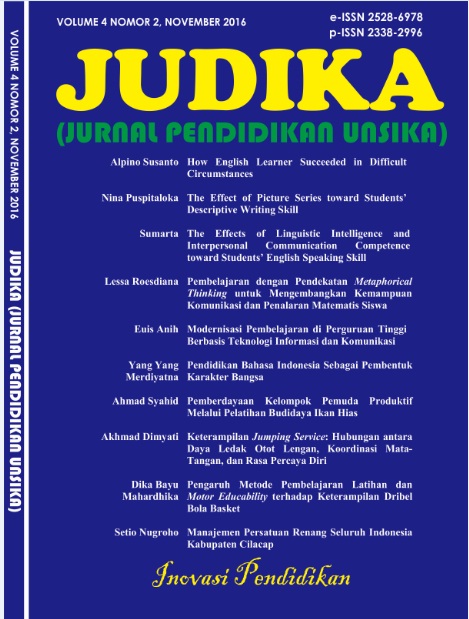HOW ENGLISH LEARNER SUCCEEDED IN DIFFICULT CIRCUMSTANCES
DOI:
https://doi.org/10.35706/judika.v4i2.383Abstract
This paper gives attention to Indonesian Ph.D students that have some challenges in learning English. The circumstance contexts of Batam as boarder zone to neighbor countries such as Singapore and Malaysia are exposed. As the interview data focus on the Ph. D students in Malaysia, being lecturer in Batam, few sample could be explored but deeply in a focus group discussion. Researcher asks why a few individuals succeed in achieving competence in English where the majority is more fail understandably. The research theory of individual learner differences such as aptitude, motivation and learning strategy, have been included even though in the foreign language learner context, less empirical investigation of whether the factors could explain Foreign Language achievement. This could be due to the exposure to use of English is severely limited. It is known that classroom behavior must be understood in its social and cultural context. A small-scale exploratory study into the attitudes, learning behavior and English achievement of the 7 Ph.D students in Batam has been reported. Analysis of interview data shows that formal and informal learning opportunities seem a bit scarce, frustrating most English learners. Through the students as the respondent has demonstrated a personal investment to learn, and resourcefulness to pursue their goals independently.
Keywords: Language Learner, Circumstances
Downloads
References
Azarnosh, M. 2014. “When Learning English is Compulsory at School: Fluctuations in L2 Motivational Self System”. International Journal of Applied Linguistics & English Literature. 3, (6).
Benson, P. 2001. Teaching and researching autonomy. Harlow: Pearson Education.
Cohen, L., Manion, L., and Morrison, K. 2007. Research methods in education. Sixth Edison. London: Routledge Falmer.
D?rnyei, Z. 2009. “Motivation in second and foreign language learning”. Journal of Language Teaching. 31 (03), 117135.
___________. 2001. Teaching and researching motivation. Harlow: Longman.
Dörnyei, Z., and Ottó. 1998. Motivation in action: A process model of L2 motivation. In Working Papers in Applied Linguistics 4. London: Thames Valley University.
Dörnyei, Z., and Skehan, P. 2003. Individual Differences in Second Language Learning. Individual Differences in L2 Learning.
Ehrmana, M. E., Leaverb, B. L., and Oxford, R. L. 2003. A brief overview of individual differences in second language learning.
Gardner, R, C. 2012. Integrative motivation and global language (English) acquisition in Poland. Studies in Second Language Learning and Teaching. Department of English Studies, Faculty of Pedagogy and Fine Arts, Adam Mickiewicz University, Kalisz SSLLT. 2 (2). 215-226.
_____________ 2007. Motivation and Second Language Acquisition. University of Western Ontario: PORTA LINGUARUM 8. pp 9-20.
_____________ 2005. Integrative motivation and second language acquisition. the Canadian Association of Applied Linguistics and the Canadian Linguistics Association on May 30, 2005 at The University of Western Ontario. London, Canada: University of Western Ontario
_____________ 1985. Social psychology and second language learning: The role of attitude and motivation. London: Edward Arnold.
Lamb, M. 2002. Explaining successful language learning in difficult circumstances. Prospect Vol. 17, No. 2. University of Leeds,UK.
_________ 2000. September. ‘Can we change our students’ learning behaviour?’ Paper presented at Conference on Education in Indonesia at the University of Leeds, Leeds, UK.
Larsen-Freeman, D., 2001. Individual cognitive/affective learner contributions and differential success in second language acquisition. In M Breen (ed). Learner contributions to language learning. Harlow: Pearson Education.
Littlewood, W., 1999. ‘Defining and developing autonomy in East Asian contexts’. Applied Linguistics, 20, 1: 71–94.
Norton, B., and Toohey, K., 2001. ‘Changing perspectives on good language learners’. TESOL Quarterly, 35, 2: 307–22.
Priyadi, A., and Ismuadi., 1998. July. ‘Improving the capability of civil servants of East Java Provincial Government’. Paper presented at National Conference in Batu, Malang.
Sinclair, J., and Webb, J. 1985. A survey of language needs in Indonesian public administration. London: Overseas Development Administration.
Schmidt., R. 2010. “Attention, awareness, and individual differences in language learning”. Proceedings of CLaSIC 2010, Singapore, December 2-4 (pp. 721-737). Singapore: National University of Singapore.
Smith, H. 2000. Language, education and development. In J Shaw, D Lubelska and M Noullet (eds). Partnership and interaction. Bangkok: Asian Institute of Technology.
van Lier, L. 2000. From input to affordance: Social-interactive learning from an ecological perspective. In J P Lantolf (ed). Sociocultural theory and second language learning. Oxford: Oxford University Press.
Wenden, A. L. 2001. Metacognitive knowledge in SLA: The neglected variable. In M Breen (ed). Learner contributions in language learning. Harlow: Pearson Education.
Zafar, S., and Meenakshi, K. 2012. Individual Learner Differences and Second Language Acquisition: A Review.



